Feedback on the international conference on "dissonant voices" in the climate change debate
 About 55 persons participated, on March 7 and 8 2013 in Meudon, to the international conference "Challenging the 'climate consensus'. Perspectives from the social sciences and humanities to analyze 'dissonant voices' in the public debate on climate change" organized within the ENVIGLOB project funded by the research consortium Climat-Environnement-Société (GIS Climat).
About 55 persons participated, on March 7 and 8 2013 in Meudon, to the international conference "Challenging the 'climate consensus'. Perspectives from the social sciences and humanities to analyze 'dissonant voices' in the public debate on climate change" organized within the ENVIGLOB project funded by the research consortium Climat-Environnement-Société (GIS Climat).
Conference outline
Climate change is one of the most important global challenges of our time, and scientists have firmly established the reality of the phenomenon, its man-made origins and the necessity to take mitigation and adaptation measures. Yet, like in other fields where political action is closely associated to scientific expertise, "dissonant voices" continue to challenge the mainstream view, obtaining more or less visibility in mass media in different countries and at different moments of the climate debate. How can we explain these phenomena? While research in social sciences has seen the emergence of a rich literature on "climate skeptics", "climate controversies" and "climate denial" lately, no common explanation seems to be able to encompass the specificities of national climate debates and the multiplicity of reasons to challenge "the climate consensus". This international conference succeeded to the workshop "climate controversies in the media" that we organized in September 2010 in Paris. It aimed at confronting different theoretical approaches and methodologies, in order to determine what each approach can contribute to a more complete understanding of the phenomenon, what it helps to see and what are its dead angles.
Organizers: Stefan Aykut, Hélène Guillemot, Chantal Pacteau
Institutional support: Research Consortium Climate-Environment-Society (GIS Climat-Environnement-Société)
Résumé
Le changement climatique est un des problèmes globaux majeurs de notre temps, et les scientifiques ont solidement établi la réalité du phénomène, ses origines anthropiques et la nécessité de prendre des mesures d'atténuation et d'adaptation. Néanmoins, comme dans d'autres champs où l'action politique est intimement liée à l'expertise scientifique, des « voix dissonantes » continuent à se faire entendre, obtenant plus ou moins de visibilité médiatique selon les contextes nationaux et les phases du débat climatique. Comment expliquer ces phénomènes ? S'il y a aujourd'hui une littérature de plus en plus riche en sciences sociales sur les « climato-sceptiques », les « controverses climatiques » ou le « déni climatique », aucune explication commune ne semble en mesure de rendre compte des spécificités des débats nationaux et de la multiplicité des raisons pour contester le « consensus climatique ». Cette conférence internationale faisait suite au workshop "controverses climatiques dans les médias" que nous avions organisé en septembre 2010 à Paris. Elle avait pour objet de confronter différentes approches théoriques et méthodologiques, afin d'examiner comment chacune de ces démarches peut contribuer à une compréhension plus complète du phénomène, ce qu'elle permet de voir et quels sont ses angles morts.
Organisateurs : Stefan Aykut, Hélène Guillemot, Chantal Pacteau
Soutien institutionnel: GIS Climat Environnement Société
Programme
See the conference program
Documents
Download the bibliography on climate change denial analysis supplied by Riley Dunlap
Download the synthesis of the conférence "Les voix dissonantes dans le débat sur le changement climatique"
The speakers' presentations
Opening - welcome and introduction
Sylvie Joussaume, director of the GIS Climat-Environnement-Société
Stefan Aykut, LATTS, University Paris Est Marne la Vallée and IFRIS
Listen to the introduction
Anatomy of dissent : a cultural analysis of climate skepticism
Myanna Lahsen, Centre for Earth System Science, Insituto Nacional de Pesquisas Espaciais
Discussant : Jean Foyer, ISCC
See the pdf presentation
Listen to the talk
A public problem approach to dissonant voices in the public debate on climate change in France.
Jean-Baptiste Comby, CARISM, Université Panthéon-Assas
Discussant : Bilel Benbouzid, LATTS, Université Paris-Est-Marne-la-Vallée
See the pdf presentation
Ecouter la présentation (french only)
Accéder au rapport "Un problème « réchauffé » ? Les changements climatiques dans les médias généralistes 2007‐2011"
Challenging climate change or its dominant framing ? Epistemic cultures in climate debates.
Hélène Guillemot, Centre Alexandre Koyré, EHESS
Discussant : Nathalie Jas, INRA, RiTME
See the pdf presentation
Ecouter la présentation (french only)
Mapping controversies on climate change adaptation.
Nicolas Baya-Laffite and Tomasso Venturini, Sciences-Po Paris
Discussant : Sebastian Grevsmühl, TEUS, Université Pierre et Marie Curie (Paris 6)
See the pdf presentation
Ecouter la présentation (french only)
Living in denial: climate change, emotions and everyday life.
Kari Norgaard, Oregon University (recorded intervention)
See and listen to the ppt file (open the ppt file and start the slideshow)
First roundtable : Climate-skepticism, public debate and political action: what are the links?
Amy Dahan, Centre Alexandre Koyré, CNRS/EHESS
Hervé Le Treut, IPSL
Jean Charles Hourcade, CIRED
Moderation : Chantal Pacteau, GIS Climat-Environnement-Société
Analyzing organized resistance to climate change. The American anti-environmental movement and it's political impact.
Riley Dunlap, Oklahoma State University
Discussant : Pierre-Benoît Joly, INRA / Ifris (Labex sites)
See the pdf presentation
Listen to the talk
Coastal flooding, uncertainty and climate change : science as a solution to (mis)perceptions?
Juan Baztan, Marine Sciences for Society and Université de Versailles Saint Quentin en Yvelines.
Discussant : Stefan C. Aykut, LATTS, University Paris-Est Marne-la-Vallée and IFRIS.
See the pdf presentation
Listen to the talk
Second roundtable: Analyzing skepticism and dissonant voices in the climate debate: research interests, analytical tools and their political implications.
Alain Nadaï, CIRED
Riley Dunlap, Oklahoma State University
Valérie Masson-Delmotte, LSCE
Myanna Lahsen, Center for Earth System Science Instituto Nacional de Pesquisas Espaciais Moderation : Kjersti Flottum, University of Bergen
Listen to the debate
Ecouter la traduction française







